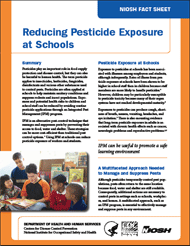Reducing Pesticide Exposure at Schools
September 2007
DHHS (NIOSH) Publication Number 2007-150

Pesticides play an important role in food supply protection and disease control, but they can also be harmful to human health. The term pesticide applies to insecticides, herbicides, fungicides, disinfectants and various other substances used to control pests. Pesticides are often applied at schools to maintain sanitary conditions and suppress rodents and insect populations. Exposures and potential health effects to children and school staff can be reduced by avoiding routine pesticide applications through an integrated pest management (IPM) program.
IPM is an alternative pest-control technique that manages and suppresses pests by preventing their access to food, water and shelter. These strategies can be more cost-efficient than traditional pest control options. Using IPM at schools can reduce pesticide exposures of workers and students.
Reducing Pesticide Exposure at Schools [PDF – 200 KB]
